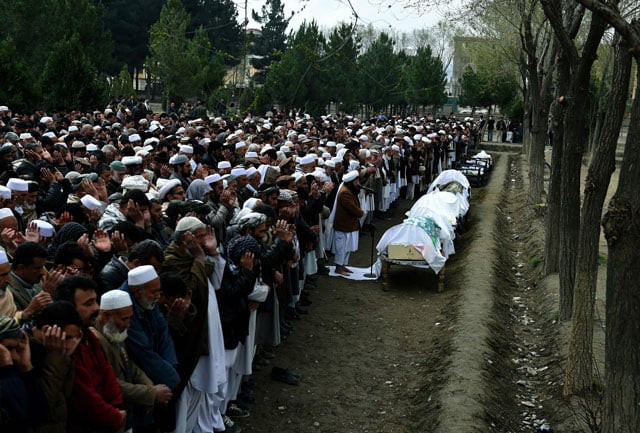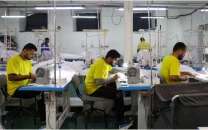Anguish as Kabul family buries 10 drowned migrants
Between January and mid-February alone, 320 people have died crossing the Aegean Sea

Afghan mourners offer funeral prayers for members of a family who drowned trying to cross the Aegean Sea between Turkey and Greece during a funeral ceremony in Kabul on March 12, 2016. PHOTO: AFP
The coffins sit open in the courtyard of the family home in Kart-e-Seh, a middle-class neighbourhood in the Afghan capital, the bodies of four boys and one older man wrapped in black material but their faces exposed.
 Afghan mourners carry the coffins of members of a family who drowned trying to cross the Aegean Sea between Turkey and Greece during a funeral ceremony in Kabul on March 12, 2016. PHOTO: AFP
Afghan mourners carry the coffins of members of a family who drowned trying to cross the Aegean Sea between Turkey and Greece during a funeral ceremony in Kabul on March 12, 2016. PHOTO: AFPOne coffin is notably smaller than the others. It belongs to Faiz, who was just nine months old when he drowned in the Aegean Sea last week along with nine other members of his family.
18 dead as migrant boat sinks off Turkey
"You can see that the bodies are being washed now," says Ashraf, a cousin of the family, as half a dozen men tend to the corpses in an Islamic funeral rite.
One, seemingly at the end of his strength, murmurs a prayer. Another bites into his scarf to suppress a sob.
Only men are allowed to participate in this ceremony for their male relatives. Two houses along, the women of the family are doing the same for the five women and girls who drowned on the same crossing between Turkey and Greece.
 Afghan mourners carry the coffins of members of a family who drowned trying to cross the Aegean Sea between Turkey and Greece during a funeral ceremony in Kabul on March 12, 2016. PHOTO: AFP
Afghan mourners carry the coffins of members of a family who drowned trying to cross the Aegean Sea between Turkey and Greece during a funeral ceremony in Kabul on March 12, 2016. PHOTO: AFPOf the members of the Skanderi family who attempted the voyage, only the father of the five children who drowned has survived.
"He is in a hospital in Turkey," Ashraf explains. "We are all from the same village, from the same neighbourhood. We grew up together," he says as the tears begin to flow again.
Four-year-old Afghan boy dies on migrant boat
The scene reveals the tragic human story behind statistics from the International Organization for Migration showing that between January and mid-February alone, 320 people died crossing the Aegean.
More than 130,000 people have travelled to Greece via Turkey since the start of the year, according to the same group, most of them Afghans, Syrians and Iraqis fleeing conflict and a bleak economic climate.
 Afghan mourners surround the bodies of members of a family who drowned trying to cross the Aegean Sea between Turkey and Greece during a funeral ceremony in Kabul on March 12, 2016. PHOTO: AFP
Afghan mourners surround the bodies of members of a family who drowned trying to cross the Aegean Sea between Turkey and Greece during a funeral ceremony in Kabul on March 12, 2016. PHOTO: AFPOf those, 42,000 are stuck in Greece, a series of border closures in the Balkans blocking them from continuing further into Western Europe.
"Life is very hard in Kabul. That's the reason why they left. I work in a hotel-restaurant and the money is too tight," says Atiqullah, a cousin of the family who did not wish to give his full name.
Ashraf is less certain. "We all know that Afghanistan faces a lot of challenges. But they (the Skanderis) did not face huge problems. They lacked nothing. It was fate that pushed them to leave. It was God's will."
An uncle of the family and General Abdul Rashid Dostum, the Afghan first vice-president and former warlord, both contributed towards the cost of repatriating the bodies.
The Skanderis left Kabul a month ago and set out on the now notorious route to Europe via Iran and Turkey, before their boat sank on Friday last week.
Like most of the thousands of Afghans who migrate to Europe, the family paid "thousands of dollars" to people smugglers, according to Qadir, a relative.
"They took a mortgage to pay for their trip," he says.



















COMMENTS
Comments are moderated and generally will be posted if they are on-topic and not abusive.
For more information, please see our Comments FAQ